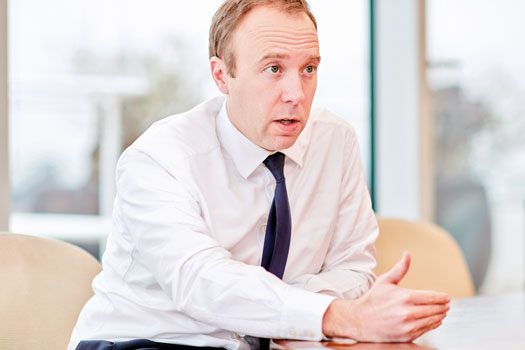PCNs have been received ‘incredibly well’, says Hancock

Exclusive Primary care networks have gone down ‘incredibly well’ and will help alleviate the workload crisis in general practice, the health secretary has claimed in an exclusive interview with Pulse.
Talking about the rising workloads in general practice, Matt Hancock said that primary care networks (PCNs) will allow practices to easily see ‘what best practice looks like’.
He also told Pulse that the upcoming access review will alleviate pressures on general practice, saying that practices that modernise through triage and access ‘tend to have less pressure on staff’.
In the interview, Mr Hancock also said that he was confident that international GPs will be tempted to come to the UK after the Government removes some of the bureaucracy.
Speaking to Pulse, Mr Hancock said:
- He has turned around declining GP numbers;
- The ‘NHS Visa’ will make it easier for overseas GPs to practise in the UK;
- He is in talks with the Treasury about removing the pensions tax allowance taper, as revealed by Pulse;
- The clinical evidence is there in favour of DNA testing;
- That things are ‘moving in the right direction’ in general practice.
Pulse raised the workload survey earlier this year, which showed GPs working 13-hour days and seeing an unsafe number of patients, and asked how he would turn that around.
He said: ‘You are totally right. Look, GPs are trained experts in helping people stay healthy and diagnosing problems. The primary care networks have gone down incredibly well across general practice and they are being supported to be able to make these improvements in access and process.
‘One of the advantages we are already seeing amongst PCNs is not just that different practices can see what best practice looks like within a group locally, but also that there is the administrative capacity to make improvements like this.’
When asked what evidence there was that PCNs have been well received, he said: ‘That’s just what I pick up from my many, many visits to practices and from all the feedback that I get. Also, if you look at the speed with which they were put in place. PCNs were announced in the early part of the year. PCNs were put in place, when they were announced in July, 98% of places already had them in place.
‘I haven’t seen an NHS England policy that has gone from announcement to full implementation in six months for a long time and that shows the level of enthusiasm behind the implementation.’
In terms of the access review, which is being led by NHS England, Mr Hancock hinted that there will be a push towards triage and the greater use of technology.
He said: ‘The survey of pressure on GP staff show that there is a vast difference between different GP practices. Those who have modernised their access practice through triage and through technology in particular tend to have less pressure on staff. The variation in both access – and the consequential pressures on staff of poor access processes – shows there is a huge amount of progress that can be made.’
Pulse reported last week that Mr Hancock had discussed the possibility of removing the pensions tax annual allowance taper, which has been blamed by the BMA for causing a number of GPs and consultants to cut hours or retire early.









